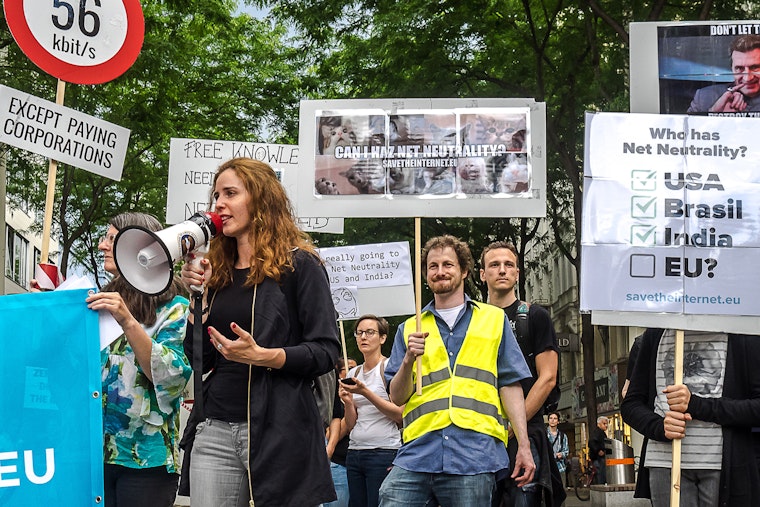How We Kept the Internet Open in Europe
By Thomas Lohninger

This summer, after three years of fierce negotiations by a broad coalition of activists, the EU established strong net neutrality protections for its citizens.
What exactly is net neutrality? Just as our roads can be used by all drivers and the electrical grid powers any device, the internet should service all users, regardless of who they are or how they want to use it. We wouldn’t want special speed limits for BMWs, or an energy supplier to power only Apple products. Similarly, the internet is communal technology, and providers must act as a common carrier for all users.
This neutrality has allowed for breathtaking innovation and diversity in the online space. But telecom companies are increasingly pushing to offer special treatment within their networks, either to the highest bidder or for their own services.
We have witnessed intense lobbying for antineutrality legislation from big service providers like Deutsche Telekom, Vodaphone, and Telefonica; giant internet companies like Facebook and Google; and network equipment manufacturers like Cisco and Nokia. Under pressure from these companies, in September 2013, the EU Commission proposed legislation—the Telecom Single Market Regulation—that included provisions that would positively abandon the principle of net neutrality.
In response, a group of seven NGOs created the Save the Internet campaign to amend this regulation. Over the course of three years, our coalition grew to a total of 32 organizations from 14 countries, and evolved into a broad-based advocacy group for net neutrality.
The coalition engaged in innovative tactics, such as having volunteers send faxes to the personal offices of European members of parliament. In a huge attention spike right before the EU parliamentary elections, over 40,000 faxes were sent to members’ offices.
This novel strategy proved quite effective. Not only did it create a physical token of the people’s will—accompanied by in-depth analysis of the legislative proposals, reports, and amendments—it also served as a reminder of the importance of an open internet, and what technology without it would be like.
The campaign was a success. On April 3, 2014, the European Parliament amended the regulation to protect against all types of net neutrality violations with a large majority.
But the fight didn’t end there. The Telecom Single Market Regulation is an ambiguous law, and enforcement is the responsibility of the national telecom regulators, an EU-level agency called the Body of European Regulators of Electronic Communication (BEREC). BEREC creates guidelines that interpret the regulation, a process that begins with a stakeholder dialogue, in which several members of the Save the Internet coalition participated. We offered BEREC written testimony on how to deliver real net neutrality, and set up a questionnaire that allowed people to express their opinion to the telecom regulators.
This worked tremedously well. The campaign received a huge amount of media attention when we personally delivered the first 100,000 comments to BEREC’s head offices in Riga, Latvia. By the end of the consultation, 481,547 comments had reached BEREC through the campaign. In previous consultations, BEREC received no more than a hundred responses, so this was a truly historic response.
The final guidelines issued by BEREC reflected the success of the campaign. They prohibit the commercial blocking or throttling of services, and prevent telecom companies from modifying users’ data streams or blocking them from using tethering (connecting another device, like a laptop, to the internet using a mobile phone).
The only unresolved issue is “zero-rating”—the practice of making certain data more or less expensive than other data. Sadly, this type of discrimination between services on the internet is not clearly prohibited, and will be evaluated on a case-by-case basis by BEREC.
Now, civil society must keep a close eye on the enforcement of the new net neutrality rules. With this new set of rules we have a good toolset to keep the internet free and open. Anyone who comes across a net neutrality violation can report it to Respect My Net—using a free an open internet, thanks, in part, to this campaign.
AKVorrat is a grantee of the Open Society Foundations.
Thomas Lohninger is executive director at AKVorrat.